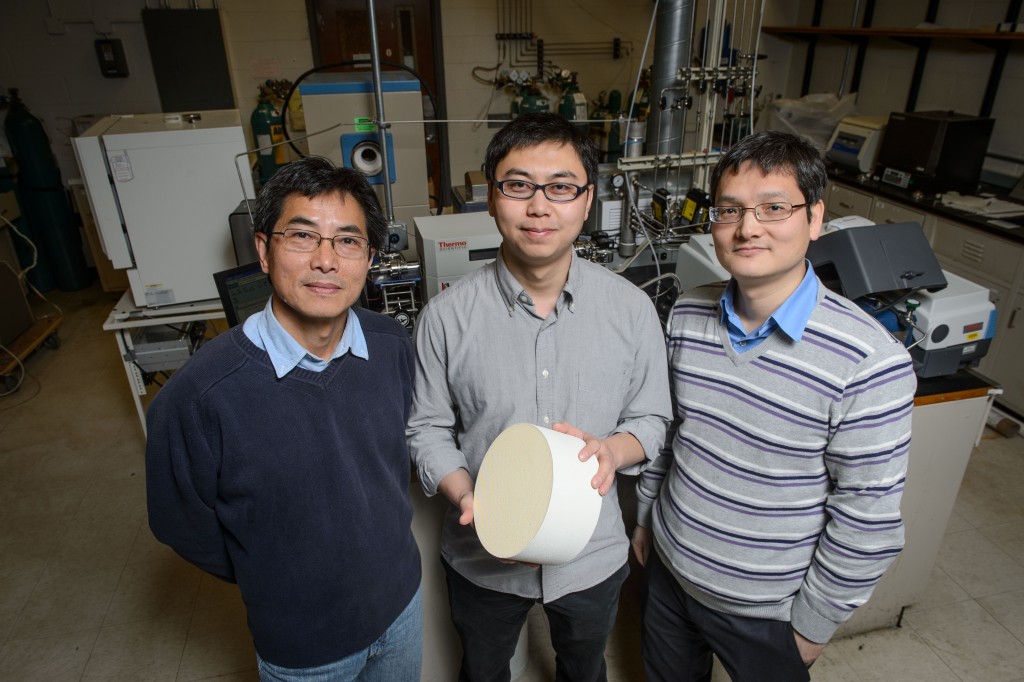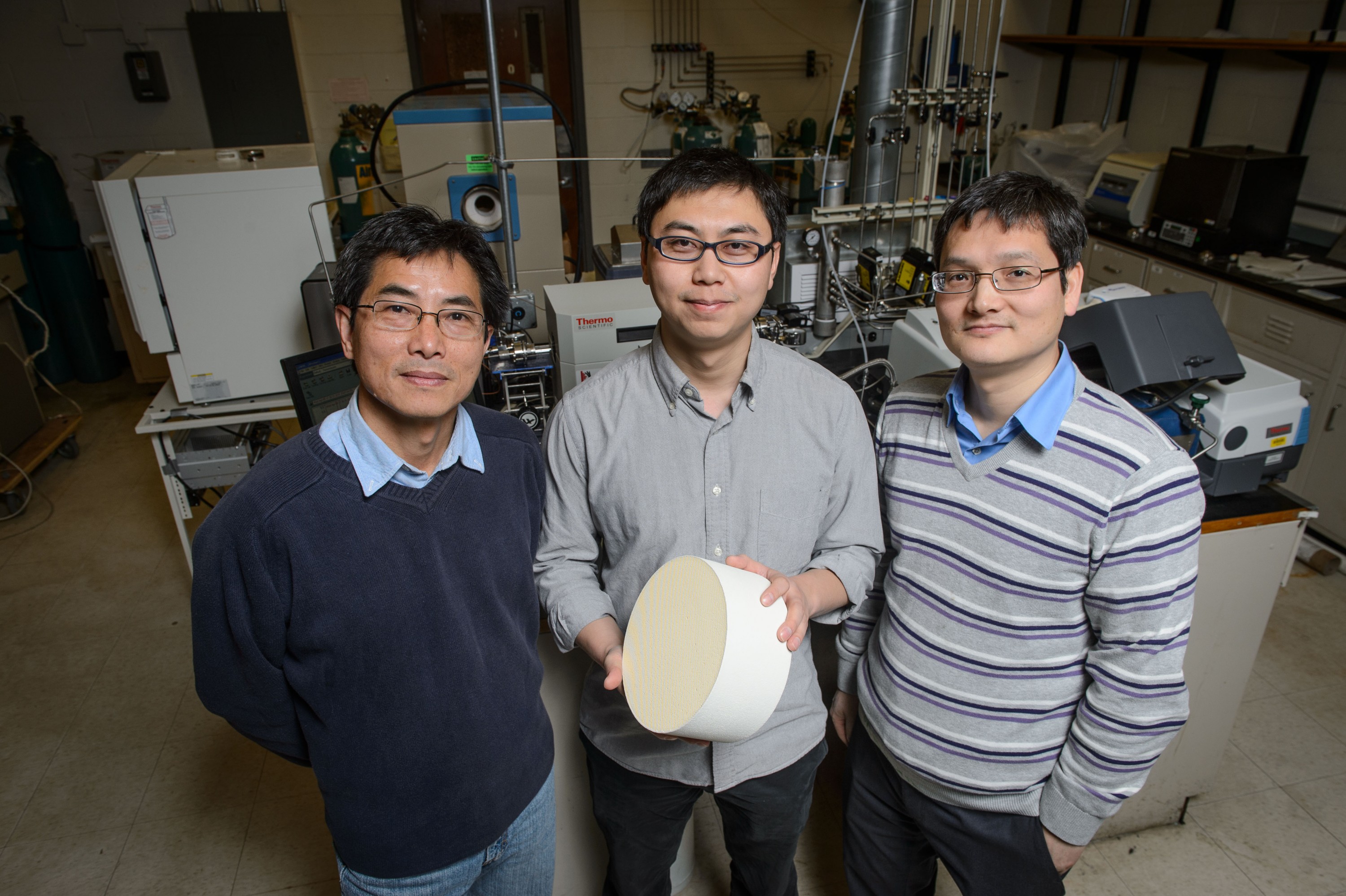Two UConn researchers have developed a technology that promises big improvements on one of the most common and important emission control tools used to protect the environment: the catalytic converter.
With help from UConn’s NSF program, Accelerate UConn, the pair are now well on their way to commercializing their new technology.
Assistant research professor Yanbing Guo and associate professor Pu-Xian Gao, both from UConn’s Department of Materials Science and Engineering and Institute of Materials Science, created an innovative nanorod-array technology to produce a novel, low-temperature catalyst for applications in automotive and industrial emission controls.
Catalytic converters control carbon monoxide, hydrocarbon, and nitrogen oxide emissions for a broad spectrum of fuels, including gasoline, diesel, propane, and natural gas. Since the device was first required for all U.S. passenger cars in the mid-1970s, it has reduced pollution by more than 10 billion tons, and is now used in all types of passenger and commercial vehicles, as well as non-road engines, such as construction machinery and lawn equipment.
Guo and Gao’s invention improves upon standard catalytic converters by reducing the amount of precious metals, such as platinum, rhodium, and/or palladium, that coat acres of surface area of a honeycomb ceramic core to create a chemical reaction converting noxious emissions into more environmentally friendly products. Using their patented process, high-efficiency nano-catalysts are fabricated within the converter device, improving low-temperature performance, increasing the lifetime of the converter, and potentially decreasing the price of the converter by up to 30 percent by reducing the use of precious metals.

“Emissions standards are only getting more and more rigorous and stringent, so in this case, ‘building a better mousetrap’ has a significant impact on the industry as well as the environment,” says Gao, the team’s ‘academic lead.’ “Our technology improves energy efficiency in industrial processes, reduces the use of precious metals that are in limited supply, and cuts down toxic emissions to improve human and environmental health. This is a game changer.”
Along with engineering this “game changer,” Guo and Gao are currently working to commercialize the technology through their startup, 3D Array Technologies. The duo have already benefited from other university entrepreneurship programs, including the School of Engineering Third Bridge grant and the Technology Incubation Program. The duo decided to take advantage of a new University program – Accelerate UConn – that helps move innovations from the lab to the market.
Guo and Gao had previous business experience and successes, such as receiving Small Business Innovation Research funding from the U.S. Environmental Protection Agency in September 2015. “But along with a $3,000 seed award, Accelerate UConn offered us support that went beyond funding,” says Guo. “We received really unique educational programming from experts in entrepreneurship, and were put in touch with incredibly knowledgeable industry contacts. I can say with 100 percent certainty that Accelerate UConn made me a better entrepreneur.”
I can say with 100 percent certainty that Accelerate UConn made me a better entrepreneur. — Yanbing Guo
Accelerate UConn launched in May 2015, and is funded through a grant from the National Science Foundation (NSF). Based on the NSF’s I-Corps curriculum, the program helps would-be UConn entrepreneurs validate promising technologies through rigorous training, a small seed grant, and connections with industry experts in the appropriate fields. Under the auspices of the Office of the Vice President for Research and the Connecticut Center for Entrepreneurship and Innovation (CCEI), Accelerate UConn aims to successfully advance more University technologies along the commercialization continuum.
“We are thrilled to provide this type of practical support to the world-class researchers at the University of Connecticut,” says Jeff Seemann, UConn vice president for research. “Successfully commercializing more of their technologies not only benefits UConn, but also has an extremely positive impact on the state of Connecticut and society.”
As the team’s “entrepreneurial lead” during the six-week program, Guo was responsible for attending weekly webinars, making presentations, and conducting interviews with potential customers to validate the researchers’ assumptions about their technology and the market. With the help of Accelerate UConn instructors, participants learned not only how to ask the right questions, but how to get out of their comfort zones and get people to talk with them in the first place.
“The goal of Accelerate UConn is for entrepreneurs to get out there and talk with their potential customers, while also getting the pedagogical framework they need,” says Tim Folta, professor of business and faculty director of CCEI. “To be successful, entrepreneurs need to have more than a great technology. They need to find their potential customers, listen to them, and incorporate that feedback into their business strategy.”
Program staff connected the researchers with industry mentor Wen Fu of CLARCOR Engine Mobile Solutions LLC in Windsor, Conn. “With 15 years’ experience in diesel engine-related industry and seven years’ experience as a general manager for sales and business development, Wen was the perfect mentor for our project,” says Guo.
Although the program required a significant commitment of time and energy, Guo and Gao believe they gained a lot from their participation, and are optimistic about their technology’s future.
“We have made crucial industry contacts, and were able to confirm a lot about our value proposition, our customers, and the best channels for distribution,” says Guo. “But we also found out that some of our prior assumptions were off-base. It’s incredibly helpful to know that now, instead of after we’ve spent time and money focusing on something that won’t make our customers buy our product. Doing this legwork now puts us in a much better position for success down the road.”
Accelerate UConn is currently accepting applications for its spring funding cycle. If you are interested in participating, go to the Accelerate UConn website and submit the brief online application by Jan. 15.



